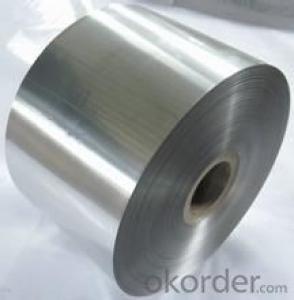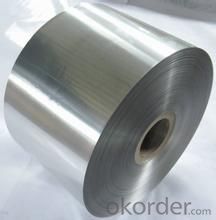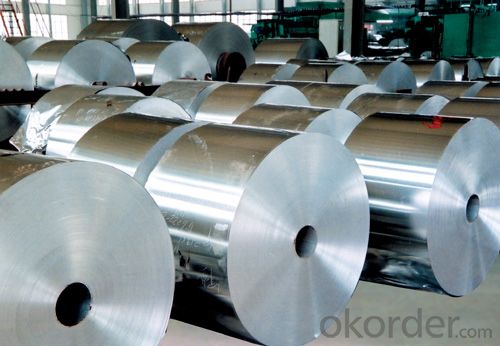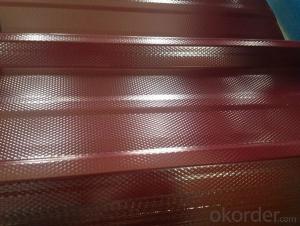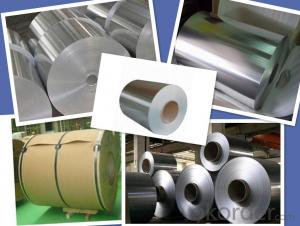Ruud Aluminum Coils Price Wholesale Aluminum Coil in China
- Loading Port:
- China Main Port
- Payment Terms:
- TT OR LC
- Min Order Qty:
- -
- Supply Capability:
- -
OKorder Service Pledge
OKorder Financial Service
You Might Also Like
Aluminium alloys (or aluminumalloys; see spellingdifferences) are alloys in which aluminium(Al) is the predominant metal. The typical alloying elements are copper, magnesium,manganese,silicon,tin and zinc. There are twoprincipal classifications, namely casting alloys and wrought alloys, both of which are furthersubdivided into the categories heat-treatableand non-heat-treatable. About 85% of aluminium is used for wrought products,for example rolled plate, foils and extrusions.Cast aluminium alloys yield cost-effective products due to the low meltingpoint, although they generally have lower tensilestrengths than wrought alloys. The most important cast aluminiumalloy system is Al–Si, where the high levels of silicon (4.0–13%)contribute to give good casting characteristics. Aluminium alloys are widelyused in engineering structures and components where light weight or corrosionresistance is required
Alloy: AA1050, 1060, 1100, AA3003, 3005, 3015, 5052, 5754, 5083,8011,etc
Temper:H14/16/18/22/24/32,HO etc.
Thickness:0.2mm—100mm
Width:100mm—2300mm (Can be slitted)
InnerDiameter: 508MM
CoilWeight:500kg-3000kg(Max.)
Application: Foil stock, Circles, Roofing, Canstock, Marine plate,Anti-sliperypurpose in vehicles, packing and appliance.
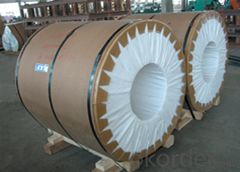
- Q: I take an extracurricular aircraft class, and I got the okay to take some old painted sheet aluminum for another project I'm working on. The problem is, what I'm using it for I need bare aluminum. I heard around that air crafts are painted with something that regular (store-bought) paint stripper can't remove. Is this true? I am aware of the fact that stripping something like that will result in a toxic paint sludge, so I've taken precautions for that. I just need to know if heavy-duty paint stripper from Home Depot will do the job. Thanks :)
- By the time you get done screwing around with different kinds of strippers, it would probably be cheaper to buy a sheet of aluminum. The USAF uses a baking soda blaster to strip paint during depot level maintenance.
- Q: What are the advantages of using aluminum coils?
- There are several advantages of using aluminum coils in various applications. Firstly, aluminum coils are lightweight compared to other materials such as copper or steel. This makes them easier to handle and transport, reducing the overall weight of the system or product they are used in. Additionally, their lightweight nature also makes installation and maintenance much simpler and more convenient. Secondly, aluminum coils have excellent corrosion resistance. They naturally form a protective oxide layer on their surface, which prevents further oxidation and corrosion, even in harsh environments. This makes them ideal for outdoor applications or in areas with high humidity or exposure to chemicals. Furthermore, aluminum coils have a high thermal conductivity, meaning they can efficiently transfer heat. This makes them particularly valuable in heating, ventilation, and air conditioning (HVAC) systems, where they can help improve energy efficiency and reduce the overall energy consumption. In addition, aluminum coils are highly flexible and can be easily formed into different shapes and sizes. This flexibility allows for greater design freedom and customization, making them suitable for a wide range of applications. They can be easily bent, cut, or shaped to fit specific requirements, without compromising their structural integrity. Lastly, aluminum coils are also cost-effective. Aluminum is abundant and widely available, making it more affordable compared to other materials. Moreover, its lightweight nature reduces transportation costs, and its corrosion resistance eliminates the need for frequent maintenance and replacements, ultimately resulting in long-term cost savings. Overall, the advantages of using aluminum coils include their lightweight nature, excellent corrosion resistance, high thermal conductivity, flexibility, and cost-effectiveness. These qualities make aluminum coils a popular choice in various industries, such as construction, automotive, aerospace, and HVAC.
- Q: How do aluminum coils perform in applications where high strength is required?
- Aluminum coils perform well in applications where high strength is required due to their excellent strength-to-weight ratio. This allows them to provide necessary structural integrity while reducing the overall weight of the application. Additionally, aluminum coils can be further strengthened through various alloying and heat treatment methods, making them suitable for demanding and high-stress environments.
- Q: Are there any environmental benefits to using aluminum coils?
- Using aluminum coils offers several environmental benefits. First and foremost, aluminum is a highly sustainable material that can be recycled without losing its original properties. This reduces the need for mining and extracting new raw materials, thereby decreasing the environmental impact of these processes. Additionally, recycling aluminum requires only a fraction of the energy needed to produce primary aluminum, resulting in substantial energy savings and reduced greenhouse gas emissions. In addition, aluminum coils have a longer lifespan compared to other commonly used materials like copper or steel. This means that fewer coils need to be manufactured and replaced over time, leading to reduced waste generation and a lower overall environmental impact. Furthermore, aluminum is corrosion-resistant, eliminating the need for potentially harmful treatments or coatings. This reduces the release of hazardous substances into the environment during the manufacturing and use of aluminum coils. Lastly, aluminum's lightweight nature contributes to lower transportation costs and energy consumption during distribution. This results in decreased fuel consumption and associated emissions, ultimately reducing the carbon footprint of using aluminum coils. Taking all these factors into consideration, the use of aluminum coils provides significant environmental benefits, including reduced resource extraction, energy conservation, waste reduction, and lower emissions.
- Q: Can aluminum coils be used in the production of cans?
- Yes, aluminum coils can be used in the production of cans. Aluminum is widely used in the manufacturing of cans due to its excellent properties such as lightweight, durability, and corrosion resistance. In the production process, aluminum coils are typically formed into sheets and then cut into the desired size and shape of the can. These sheets are then coated, printed, and formed into cans using various techniques. The use of aluminum coils ensures the production of high-quality cans that are suitable for packaging various beverages and food products.
- Q: My school has lunched catered in daily because it cuts down on staff in the kitchen. The food is delivered in individual aluminum containers for each student. In doing so, the school uses 99,000 aluminum trays in one school year, all of which get thrown away. I'm trying to find an alternative such as biodegradable food containers. Does anyone have any ideas? The container has to be able to withstand the heat of an oven.
- Maybe you could look into recyclable paper containers such as those that pizza places use? I'm always a big fan of materials like pyrex glass containers as they're reusable, strong, and can be returned to the company and sterilized.
- Q: Are aluminum coils suitable for marine applications?
- Yes, aluminum coils are suitable for marine applications due to their excellent corrosion resistance properties in saltwater environments.
- Q: How do aluminum coils contribute to increased structural stability?
- Several factors contribute to the increased structural stability provided by aluminum coils. Firstly, the material itself, aluminum, is highly durable and possesses an excellent strength-to-weight ratio. This means that despite being lightweight, aluminum coils offer superior strength and stability, making them an ideal choice for various structural applications. Additionally, the corrosion resistance of aluminum coils is crucial for maintaining structural integrity over time. Unlike other metals, aluminum does not easily rust or deteriorate, even in harsh environmental conditions. This corrosion resistance ensures that the coils will remain structurally sound and reliable for extended periods. Moreover, aluminum coils exhibit high thermal conductivity, allowing for efficient heat transfer. This characteristic is particularly beneficial for structures exposed to temperature variations, as it facilitates the even distribution and dissipation of heat. By doing so, it prevents potential damage caused by thermal expansion or contraction. Another significant advantage of aluminum coils lies in their flexibility. Aluminum is a malleable material that can be easily bent, shaped, and formed into various configurations. This flexibility enables the coils to adapt to different structural requirements, allowing for more intricate designs and enhancing overall stability. Furthermore, aluminum is a non-combustible material, making it a safe choice for structural applications. In the event of a fire, aluminum coils will not contribute to the spread of flames, thus maintaining the integrity of the structure and ensuring the safety of occupants. In conclusion, the durability, corrosion resistance, thermal conductivity, flexibility, and fire-resistant properties of aluminum coils all contribute to increased structural stability. These characteristics make aluminum coils a reliable and efficient choice for a wide range of structural applications, providing long-lasting stability and safety.
- Q: What are the applications of aluminum coils?
- Due to their unique properties and versatility, aluminum coils find wide-ranging applications in various industries. The construction industry is one major field where these coils are extensively used. They are lightweight, durable, and resistant to corrosion, making them suitable for roofing, siding, and insulation purposes. Additionally, aluminum coils are commonly employed in the production of gutters, downspouts, and ventilation systems for buildings. In the automotive sector, aluminum coils are utilized for manufacturing different components like heat shields, radiators, and condensers. The lightweight nature of aluminum makes it an ideal choice for enhancing fuel efficiency and reducing the overall weight of vehicles. Moreover, aluminum coils are employed in the production of heat exchangers and air conditioning systems in automobiles. The packaging industry also heavily relies on aluminum coils. They are commonly used to manufacture beverage cans, food containers, and packaging materials. Aluminum's high ductility and excellent formability make it a preferred material for producing these products. Additionally, aluminum coils act as a barrier against moisture, light, and oxygen, ensuring the preservation and protection of the packaged contents. In the electrical and electronics industry, aluminum coils find a crucial application. They are utilized in the production of transformers, power distribution systems, and electrical conductors. The high electrical conductivity and low density of aluminum make it advantageous for these purposes. Furthermore, aluminum coils are employed in the manufacturing of appliances such as refrigerators, air conditioners, and washing machines. They are also utilized in the production of furniture, decorative items, and various consumer goods. In conclusion, aluminum coils have vast and diverse applications in industries ranging from construction and automotive to packaging, electrical, and consumer goods. The combination of lightweight, durability, corrosion resistance, and excellent formability make aluminum coils an indispensable material in numerous sectors.
- Q: What is the role of aluminum coils in the construction of railways?
- Aluminum coils are used in the construction of railways for various purposes, primarily for the manufacturing of overhead lines and electrical conductors. Due to their high conductivity, lightweight nature, and corrosion resistance, aluminum coils are ideal for transmitting electrical power and ensuring efficient and reliable railway operations. These coils are also utilized in the production of railway carriages and components, providing strength and durability while reducing overall weight, which ultimately improves fuel efficiency and lowers operating costs. Overall, aluminum coils play a crucial role in enhancing the performance, safety, and sustainability of railway systems.
Send your message to us
Ruud Aluminum Coils Price Wholesale Aluminum Coil in China
- Loading Port:
- China Main Port
- Payment Terms:
- TT OR LC
- Min Order Qty:
- -
- Supply Capability:
- -
OKorder Service Pledge
OKorder Financial Service
Similar products
Hot products
Hot Searches
Related keywords
